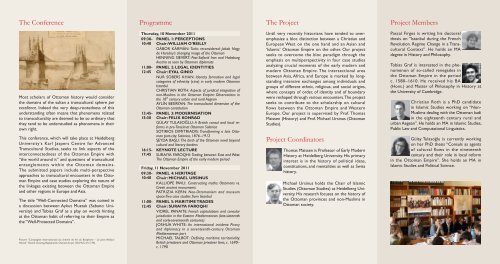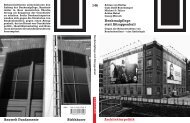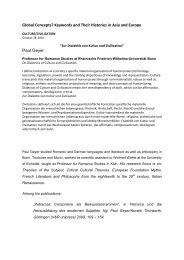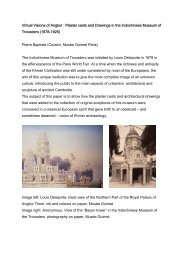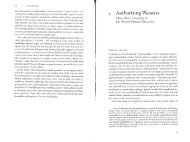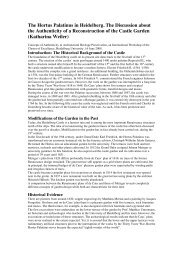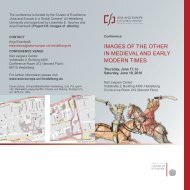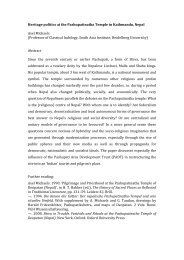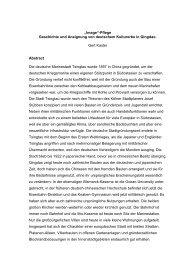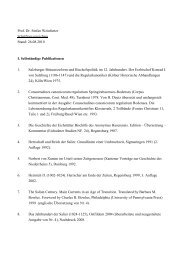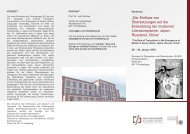The Conference The Project Project Coordinators Project Members ...
The Conference The Project Project Coordinators Project Members ...
The Conference The Project Project Coordinators Project Members ...
You also want an ePaper? Increase the reach of your titles
YUMPU automatically turns print PDFs into web optimized ePapers that Google loves.
<strong>The</strong> <strong>Conference</strong><br />
Most scholars of Ottoman history would consider<br />
the domains of the sultan a transcultural sphere par<br />
excellence. Indeed the very deep-rootedness of this<br />
understanding often means that phenomena related<br />
to transculturality are deemed to be so ordinary that<br />
they tend to be understudied as phenomena in their<br />
own right.<br />
This conference, which will take place at Heidelberg<br />
University’s Karl Jaspers Centre for Advanced<br />
Transcultural Studies, seeks to link aspects of the<br />
interconnectedness of the Ottoman Empire with<br />
“the world around it” and questions of transcultural<br />
entanglements within the Ottoman domains.<br />
<strong>The</strong> submitted papers include multi-perspective<br />
approaches to transcultural encounters in the Ottoman<br />
Empire and case studies exploring the nature of<br />
the linkages existing between the Ottoman Empire<br />
and other regions in Europe and Asia.<br />
<strong>The</strong> title “Well-Connected Domains” was coined in<br />
a discussion between Aykut Mustak (Sabancı University)<br />
and Tobias Graf as a play on words hinting<br />
at the Ottoman habit of referring to their Empire as<br />
the “Well-Protected Domains”.<br />
Picture: “Compagnie internationale du chemin de fer du Bosphore – Le pont Abdoul<br />
Hamid.” Sketch drawing, Başbakanlık Osmanlı Arşivi (YA.HUS, 411/174).<br />
Programme<br />
Thursday, 10 November 2011<br />
09:30- PANEL 1: PERCEPTIONS<br />
10:40 Chair: WILLIAM O’REILLY<br />
GÁBOR KÁRMÁN: Turks reconsidered: Jakab Nagy<br />
de Harsány’s changing image of the Ottoman<br />
HENNING SIEVERT: Post-Safavid Iran and Habsburg<br />
Austria as seen by Ottoman diplomats<br />
11:00- PANEL 2: LEGAL IDENTITIES<br />
12:45 Chair: EYAL GINIO<br />
NUR SOBERS KHAN: Identity formation and legal<br />
categories of ethnicity (cins) in early modern Ottoman<br />
Istanbul<br />
CHRISTIAN ROTH: Aspects of juridical integration of<br />
non-Muslims in the Ottoman Empire: Observations in<br />
the 18<br />
i i<br />
o<br />
th century urban and rural Aegean<br />
AYLIN BESIRYAN: <strong>The</strong> transcultural dimension of the<br />
Ottoman constitution<br />
13:45- PANEL 3: MODERNISATION<br />
15:30 Chair: FELIX KONRAD<br />
GÜLAY TULASOGLU: A British consul and local reforms<br />
in pre-Tanzimat Ottoman Salonica<br />
SOTIRIOS DIMITRIADIS: Transforming a late Ottoman<br />
port-city: Salonica, 1876–1912<br />
ŞEYDA BAŞLI: <strong>The</strong> birth of the Ottoman novel beyond<br />
cultural and literary borders<br />
16:15- KEYNOTE LECTURE<br />
17:45 SURAIYA FAROQHI: Trading between East and West:<br />
<strong>The</strong> Ottoman Empire of the early modern period<br />
Friday, 11 November 2011<br />
09:30-<br />
10:40<br />
11:00-<br />
12:45<br />
PANEL 4: HERITAGE<br />
Chair: MICHAEL URSINUS<br />
KALLIOPE PAVLI: Constructing myths: Ottomans vs.<br />
Greek ancient monuments<br />
PATRIZIA KERN: Neo-Ottomanism and museum<br />
space: Two case studies from Istanbul<br />
PANEL 5: MARITIME TRADES<br />
Chair: SURAIYA FAROQHI<br />
VIOREL PANAITE: French capitulations and consular<br />
jurisdiction in the Eastern Mediterranean (late-sixteenth<br />
and early-seventeenth centuries)<br />
JOSHUA WHITE: An international incident: Piracy<br />
and diplomacy in a seventeenth-century Ottoman<br />
Mediterranean port<br />
MICHAEL TALBOT: Defining maritime territoriality:<br />
British privateers and Ottoman privateer lines, c. 1690–<br />
c. 1790<br />
<strong>The</strong> <strong>Project</strong><br />
Until very recently historians have tended to overemphasize<br />
a bloc distinction between a Christian and<br />
European West on the one hand and an Asian and<br />
‘Islamic’ Ottoman Empire on the other. Our project<br />
seeks to overcome the bloc paradigm through the<br />
emphasis on multiperspectivity in four case studies<br />
analyzing crucial moments of the early modern and<br />
modern Ottoman Empire. <strong>The</strong> intersectional area<br />
between Asia, Africa, and Europe is marked by longstanding<br />
intensive exchanges among individuals and<br />
groups of different ethnic, religious, and social origins,<br />
where concepts of order, of identity and of boundary<br />
were reshaped through various encounters. <strong>The</strong> project<br />
seeks to contribute to the scholarship on cultural<br />
flows between the Ottoman Empire and Western<br />
Europe. Our project is supervised by Prof. Thomas<br />
Maissen (History) and Prof. Michael Ursinus (Ottoman<br />
Studies).<br />
<strong>Project</strong> <strong>Coordinators</strong><br />
Thomas Maissen is Professor of Early Modern<br />
History at Heidelberg University. His primary<br />
interest is in the history of political ideas,<br />
constitutions, and mentalities as well as Swiss<br />
history.<br />
Michael Ursinus holds the Chair of Islamic<br />
Studies (Ottoman Studies) at Heidelberg University.<br />
His research focuses on the history of<br />
the Ottoman provinces and non-Muslims in<br />
Ottoman society.<br />
<strong>Project</strong> <strong>Members</strong><br />
Pascal Firges is writing his doctoral<br />
thesis on “Istanbul during the French<br />
Revolution. Regime Change in a Transcultural<br />
Context”. He holds an MA<br />
degree in History and Philosophy.<br />
Tobias Graf is interested in the phenomenon<br />
of so-called renegades in<br />
the Ottoman Empire in the period<br />
c. 1580–1610. He received his BA<br />
(Hons.) and Master of Philosophy in History at<br />
the University of Cambridge.<br />
Christian Roth is a PhD candidate<br />
in Islamic Studies working on “Non-<br />
Muslims dealing with the Ottoman kadi<br />
in the eighteenth century rural and<br />
urban Aegean”. He holds an MA in Islamic Studies,<br />
Public Law and Computational Linguistics.<br />
Gülay Tulasoglu ğ is currently working<br />
on her PhD thesis “Consuls as agents<br />
of cultural flows in the nineteenth<br />
century and their role in local reform<br />
in the Ottoman Empire”. She holds an MA in<br />
Islamic Studies and Political Science.
Programme<br />
13:45-<br />
15:30<br />
16:00-<br />
17:10<br />
17:30-<br />
18:40<br />
PANEL 6: FRONTIERS<br />
Chair: LINDA DARLING<br />
MAXIMILIAN HARTMUTH: Toward a<br />
cultural topography of violence on the Ottoman-<br />
Habsburg frontier<br />
ANTONIS HADJIKYRIACOU & DAPHNE<br />
LAPPA: Exploring the conceptual boundaries<br />
of the concept of fl uidity: Early modern ‘contact<br />
zones’ in the Adriatic and the Eastern Mediterranean<br />
MORITZ DEUTSCHMANN: Christianity<br />
and the Russo-Iranian-Ottoman encounter in<br />
the Iranian province of Azerbajdzhan in the<br />
nineteenth century<br />
PANEL 7: NETWORKS<br />
Chair: HÜLYA CANBAKAL<br />
TOBIAS GRAF: Renegades in the Ottoman<br />
Empire and their networks, c. 1580–1610:<br />
Some refl ections<br />
DOROTHE SOMMER: Freemasonry, interconfessional<br />
sociability, and the promotion of a<br />
new Syrian self-perception, c. 1860–1908<br />
PANEL 8: STATECRAFT<br />
Chair: TBA<br />
KAY JANKRIFT: <strong>The</strong> Ottoman hub: Jewish advisors<br />
and Western diplomats at the sultan’s<br />
court in the 16th century<br />
LINDA DARLING: Advice literature as a transcultural<br />
phenomenon<br />
Saturday, 12 November 2011<br />
09:30- PANEL 9: REBELLIONS<br />
10:40 Chair: MARKUS KOLLER<br />
HÜLYA CANBAKAL: <strong>The</strong> Age of Revolution in<br />
the Ottoman Empire: A provincial perspective<br />
FELIX KONRAD: “Erâzil” and “canaille”: Ottoman<br />
and European perceptions of social unrest<br />
in the Patrona Halil rebellion of 1730<br />
11:00- PANEL 10: FRENCH REVOLUTION<br />
12:10 Chair: THOMAS MAISSEN<br />
PASCAL FIRGES: <strong>The</strong> French Revolution in<br />
Istanbul, 1793–1795<br />
HIMMET i TAŞKÖMÜR: From great sedition<br />
to great revolution: Ottoman responses to the<br />
French Revolution<br />
12:10- CONCLUDING DISCUSSION<br />
13:00 Chair: THOMAS MAISSEN<br />
<strong>The</strong> Cluster “Asia and Europe”<br />
<strong>The</strong> Cluster of Excellence “Asia and<br />
Europe in a Global Context” is an<br />
interdisciplinary network of researchers<br />
at Heidelberg University. <strong>The</strong><br />
Cluster was established in October<br />
2007 as part of the Excellence Initiative, which was launched<br />
by the German states and the federal government. It is<br />
supervised by the German Research Foundation (DFG) and<br />
the German Science Council (Wissenschaftsrat).<br />
Today, the Cluster has about 200 researchers, who examine<br />
the processes of cultural exchange between Asia and<br />
Europe. In particular, they analyse the shifting asymmetries in<br />
cultural, social and political fl ows. <strong>The</strong>ir work probes issues<br />
relevant to contemporary concerns about globalization by<br />
investigating into the cultural transfer of ideas, knowledge<br />
and commodities.<br />
How to fi nd us<br />
<strong>The</strong> Cluster is located at the Karl Jaspers Centre for<br />
Advanced Transcultural Studies, Voßstraße 2, Heidelberg,<br />
Germany.<br />
To reach us from Heidelberg Main Station, take buses no. 32<br />
(direction “Universitätsplatz”), 33 (direction “Ziegelhausen”),<br />
34 (direction “Wilhelmsfeld”) or 735 (direction “Eiterbach”),<br />
or trams no. 5 (direction “Schriesheim”) or 21 (direction<br />
“Handschuhsheim”). Get off at the stations “Thibautstraße”<br />
or “Bismarckplatz”. From there, it is just a few minutes’ walk<br />
to the Karl Jaspers Centre.<br />
Contact<br />
<strong>Project</strong> A7<br />
Cluster of Excellence “Asia and Europe”<br />
Karl Jaspers Centre<br />
Voßstr. 2<br />
69115 Heidelberg, Germany<br />
Phone: +49 (0)6221 54-4309<br />
E-mail: well-connected@asia-europe.uni-heidelberg.de<br />
www.well-connected.uni-hd.de


